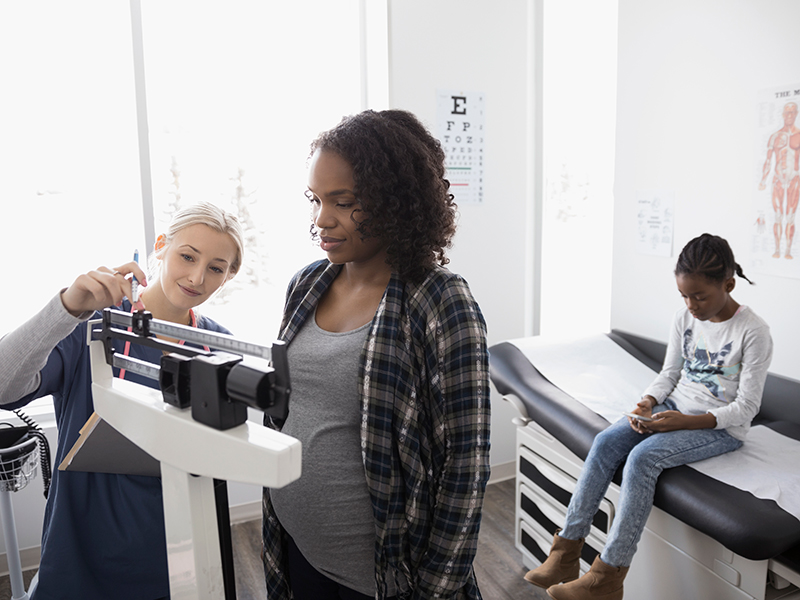Blood pressure disorders that include preeclampsia are leading causes of pregnancy-related deaths. What’s more, the National Institutes of Health says the incidence of preeclampsia has been steadily increasing for the last 30 years in the United States.
High blood pressure can take many forms:
- Chronic hypertension: high blood pressures before pregnancy
- Gestational hypertension: high blood pressure in pregnancy that usually resolves after birth
- Preeclampsia: high blood pressure and protein in the urine
- Eclampsia: severe form of preeclampsia when seizures develop
- HELLP syndrome: severe form of preeclampsia with low platelets, liver damage and bleeding concerns that can develop after delivery
Learn more: What causes preeclampsia?
Symptoms and signs of preeclampsia
It has been called “toxemia” and “pregnancy induced hypertension” in the past, but the symptoms of preeclampsia have not changed. It is a real and dangerous disease that can develop during pregnancy and up to six weeks after delivery.
This condition can start to appear in the second half of pregnancy (after 20 weeks). Typical preeclampsia starts with elevated blood pressures and excess protein in the urine. But, not every case is typical. Other warning signs and symptoms include:
- Severe headache that does not go away
- Changes in your vision (blind spots, flashes of light, loss of vision)
- Pain in the upper abdomen that does not go away
- New shortness of breath
- New or worsening swelling that does not go away (legs, face, hands)
Most women do not feel sick at first when the disease is mild. In fact, many women only start to feel sick when the disease has reached a severe level. Severe preeclampsia can lead to seizures, strokes and even death of the mom or baby. This disease can progress rapidly so it is important to report any strange new symptoms to your OB.
Consult with a specialist: Maternal fetal medicine from Sanford Health
Who is at higher risk?
There are conditions that put you at higher risk for developing preeclampsia, and your doctor will address these at your OB visits:
- Pregnant for the first time
- Age 35 or older
- In vitro fertilization
- Carrying twins, triplets or other multiples
- Family history of preeclampsia
- Obesity before pregnancy
- Preeclampsia in a previous pregnancy
- Chronic high blood pressure before pregnancy
- Kidney disease
- Lupus
- Sleep apnea
- Diabetes
If you start to have high blood pressures during your OB visits, your doctor will monitor your pregnancy much closer. There are tests that can help to diagnose preeclampsia. These include blood pressure checks, physical exams, blood tests and urine tests. Your doctor may recommend a special urine test where you have to collect all the urine that you produce in 24 hours. This test is very important to help calculate the amount of protein in your urine.
How much do you know about preeclampsia? Take our quiz
What will happen?
If the disease is mild and your pregnancy is before 37 weeks along you may be watched closely in the clinic or admitted to the hospital. If you develop severe preeclampsia you must be treated as soon as possible. The treatment for preeclampsia is to deliver your baby. Women with preeclampsia also may need medication to control high blood pressures and a medication called magnesium sulfate to help protect the mother from developing seizures. These medications can only be given to you in the hospital.
Preeclampsia affects the baby too. It can cause the baby to grow more slowly and decrease the amount of fluid around the baby. It can also cause problems with the placenta and blood flow to the baby. If you are diagnosed with high blood pressure or preeclampsia, your doctor will start to monitor the baby much closer. You will be asked to monitor the baby’s movements at home, too.
Typically the high blood pressures and protein in the urine resolve within a few days after delivery of the baby, but some women may need to take blood pressure medications and be monitored for weeks after delivery.
If you had preeclampsia in a previous pregnancy it is important to talk to your OB early. You may be started on low-dose aspirin in your next pregnancy or a medication to lower blood pressures between pregnancies. You will likely be watched very closely for any early signs of developing preeclampsia again.
As always my goal for your pregnancy is a safe and healthy mom and baby. If you have any symptoms that are worrying you please don’t hesitate to call your OB.
Learn more
- Medications for high blood pressure during pregnancy
- Understanding high-risk pregnancies
- 8 warning signs during pregnancy
…
Posted In Health Information, Heart, Pregnancy, Vascular, Women's
